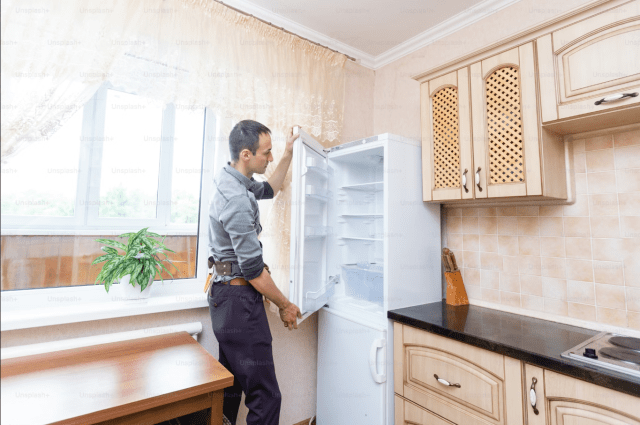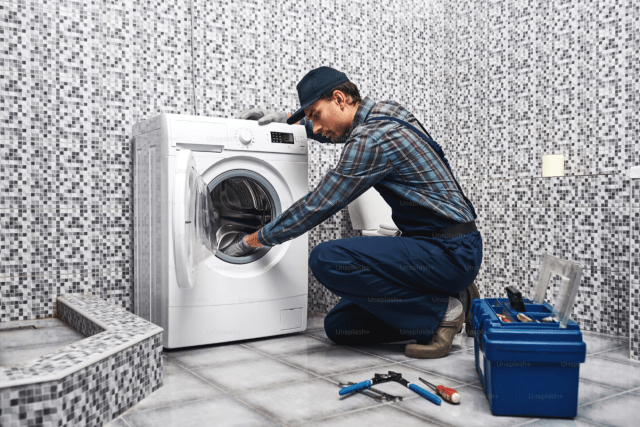
An appliance repair technician’s skills and experience directly affect repair quality and costs. This guide explains what makes a qualified technician, what credentials to look for, how to evaluate their expertise, and what you should expect during professional appliance repair service calls.
You’ve got a broken appliance and you’re calling for help. But who’s actually showing up at your door? What makes someone qualified to fix your expensive appliances? How do you know they’re any good?
The appliance repair technician who comes to your home directly affects whether your appliance gets fixed properly. Their skills, experience, and honesty determine whether you get good value or waste money.
This guide explains what makes a qualified technician, what to look for, what to expect during service calls, and how to spot technicians you should avoid.
What an Appliance Repair Technician Actually Does
Understanding what technicians do helps you evaluate their work and know what’s reasonable to expect.
Diagnosis and Problem Solving
The first job is working out what’s actually wrong. This isn’t always obvious. Symptoms can have multiple causes.
Good technicians use systematic approaches. They test components methodically. They don’t just guess and start replacing parts randomly.
They use diagnostic tools properly. Multimeters test electrical components. Pressure gauges check refrigerant. Temperature sensors verify thermostat function. Proper diagnosis requires proper equipment.
They draw on experience recognizing patterns. They’ve seen similar problems before. They know what typically fails on different appliance types and brands.
They explain problems clearly to customers. No confusing jargon. Plain language that helps you understand what’s wrong.
Repair and Replacement
Once diagnosed, technicians perform actual appliance repairs. This requires mechanical skills, electrical knowledge, and sometimes specialized training.
They replace failed components with correct parts. Using wrong parts causes immediate problems or premature failure.
They make mechanical adjustments when needed. Alignment, tension, calibration all affect how appliances work.
They handle electrical connections safely. Faulty wiring causes fires. Proper connections prevent hazards.
They test appliance repairs thoroughly before finishing. They don’t just assume it’s fixed. They verify everything works properly.
Maintenance and Prevention
Good technicians don’t just fix current problems. They spot developing issues and recommend prevention.
They notice wear on components that haven’t failed yet. Catching these early prevents future breakdowns.
They provide maintenance advice specific to your appliance. Generic tips don’t help much. Specific guidance based on your actual appliance does.
They clean and adjust things during repairs. This extends appliance life and improves performance.

Qualifications of Appliance Repair Technician to Look For
Not all technicians are equally qualified. Certain credentials indicate proper training and competence.
Formal Training and Certification
Trade qualifications show systematic training. Certificates in electrical work, refrigeration, or appliance repair indicate formal education.
Manufacturer certifications matter for specific brands. Samsung, LG, Bosch, and others offer training programs. Certified technicians know those brands thoroughly.
Ongoing education keeps skills current. Appliances constantly evolve. Technicians need regular training on new models and technologies.
Refrigeration handling licenses are legally required for working with refrigerants. Unlicensed handling is illegal and dangerous.
Electrical licenses matter for electrical work. Some appliance repairs don’t require full electrician licensing. But electrical knowledge is essential.
Experience and Specialization
Years of experience count significantly. A technician who’s been fixing appliances for 10 years has seen everything.
Specialization in certain appliance types helps. Someone who fixes fridges daily knows them better than someone who occasionally works on them.
Brand experience matters too. Technicians familiar with your appliance brand work more efficiently and make fewer mistakes.
Commercial versus residential experience differs. Commercial appliances have different requirements and complexities.
Soft Skills
Technical ability isn’t everything. Communication and professionalism matter too.
Clear communication helps you understand problems and options. You shouldn’t feel confused about what’s wrong or what’s needed.
Honesty about whether appliance repair makes sense builds trust. Good technicians tell you when replacement is smarter than expensive repairs.
Respect for your home and property shows professionalism. Technicians should clean up after themselves and protect your floors.
Reliability and punctuality demonstrate commitment. Showing up on time and doing what they promise matters.
What to Expect During Service Calls from an Appliance Repair Technician
Understanding typical service call procedures helps you know what’s normal and what’s not.
Initial Contact and Scheduling
When you first call, you should get clear information from the appliance repair technician. What will the service call cost? When can they come? What should you prepare?
Good services ask relevant questions. What type of appliance? What symptoms? When did problems start? This helps them prepare.
They give realistic timeframes. Not overpromising. Honest about current availability.
They confirm appointments properly. Reminders via text or email. Clear communication about timing.
Arrival and Introduction
The appliance repair company should arrive within the scheduled window. Delays happen but they should communicate about them.
They should introduce themselves properly. Show identification. Explain what they’ll do.
They should wear identifiable uniforms or have company vehicles. This confirms they’re actually from the service you called.
They should bring proper tools and equipment. Professional technicians arrive prepared with necessary diagnostic and appliance repair tools.
Assessment Process
Technicians should ask you detailed questions. What’s happening? What have you noticed? What have you tried already?
Appliance repair technicians should inspect the appliance thoroughly. Not just quick glances. Proper examination of relevant components.
They should test functions systematically. Watching the appliance operate reveals problems. Testing components individually identifies failures.
They should explain what they’re doing. You shouldn’t be left wondering what’s happening. Good technicians keep you informed.
Diagnosis and Recommendations
Once they’ve identified the problem, they should explain it clearly. What’s broken? Why did it fail? What needs fixing?
Appliance repair technicians should provide cost estimates before proceeding. Parts costs plus labor. Total expected charges.
They should discuss whether repair makes sense. If your appliance is old and repairs are expensive, honest technicians tell you replacement might be smarter.
They should give you time to decide. No pressure tactics. You should feel comfortable considering options.
Performing Repairs
If you approve appliance repairs, work should proceed systematically. Not rushed. Proper attention to each step.
They should handle your appliance carefully. No rough treatment. Respect for your property.
They should use quality replacement parts. Genuine or equivalent quality parts. Not cheap substitutes that fail quickly.
They should test everything when finished. Watching the appliance operate through complete cycles. Verifying all functions work properly.
Completion and Follow-Up
They should clean up completely. Remove old parts. Wipe down appliances. Leave your home as clean as they found it.
The appliance repair technician should explain what was done. Show you the failed parts if possible. Help you understand the repair.
They should provide receipts and warranties. Documentation of work performed, parts used, and warranty coverage.
They should give you maintenance advice. Tips for preventing similar problems. Care instructions for your appliance.

Working Effectively with Appliance repair Technicians
You can help ensure good service by being a good customer too.
Before They Arrive
Clear the area around your appliance. Give them easy access without obstacles.
Have appliance information ready. Model and serial numbers help them prepare.
Note specific symptoms and patterns. When does it happen? What have you noticed? Detailed information helps diagnosis.
Secure pets from the work area. Not all technicians are comfortable with animals around.
During the Visit
Be available but not hovering. Let them work but be reachable for questions.
Ask questions when you don’t understand. Don’t pretend to follow along.
Approve additional work before it proceeds. If they find extra problems, you should approve additional charges first.
Respect their expertise but verify work. Trust but verify. Watch testing of repairs before they leave.
After the Visit
Keep all documentation safely. Receipts, warranties, work descriptions. You’ll need these if problems recur.
Test the appliance thoroughly over the next few days. Make sure repairs hold up.
Contact the appliance repair technician immediately if problems persist. Warranty coverage has time limits.
Leave honest reviews. Help others by sharing your experience accurately.
Finding Quality Appliance Repair Technicians
Locating a skilled appliance repair technician requires knowing where to look and what to ask.
Check company reputations thoroughly. Reviews, references, and recommendations all matter.
Verify credentials and licensing. Ask to see proof of qualifications.
Look for established services with track records. New businesses might lack experience.
Ask about their technicians’ qualifications specifically. Company reputation and individual technician skills both matter.
Get multiple opinions for expensive repairs. Second opinions verify diagnoses and pricing.
Getting the Service You Deserve
The appliance repair technician who works on your appliances affects repair quality, costs, and how long fixes last. Qualified experienced technicians are worth finding.
Look for proper training, relevant experience, clear communication, and professional behavior. Ask questions. Watch for red flags. Trust your instincts.
Whether you need repairs for fridges, washing machines, dryers, ovens, or dishwashers, skilled technicians make the difference between money well spent and money wasted.
Finding reliable appliance repair means finding skilled technicians who do quality work at fair prices. Take time to choose well. Your appliances and your budget will benefit.
Good technicians become valuable resources you use for years. They keep your appliances working reliably. They give honest advice. They charge fairly. They’re worth their weight in gold when you find them.
Don’t settle for questionable technicians just because they’re available or cheap. Quality work from qualified appliance repair technicians saves you money long term through repairs that actually last and appliances that work properly.










